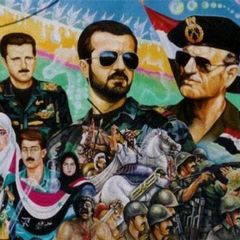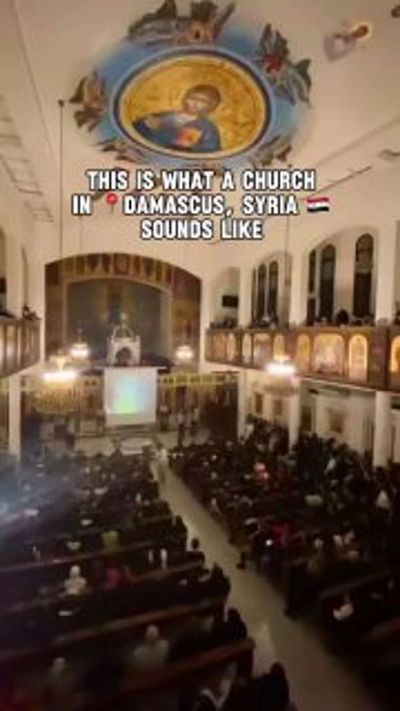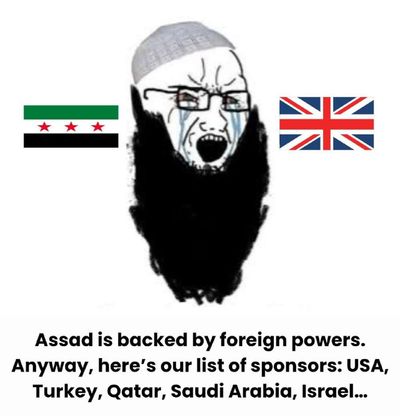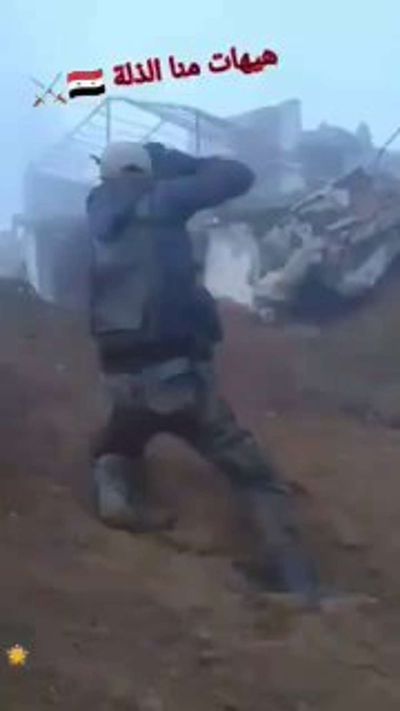
Україна Сейчас | УС: новини, політика

Україна Online: Новини | Політика

Всевидящее ОКО: Україна | Новини

Труха⚡️Україна

Николаевский Ванёк

Инсайдер UA

Лачен пише

Анатолий Шарий

Реальний Київ | Украина

Україна Сейчас | УС: новини, політика

Україна Online: Новини | Політика

Всевидящее ОКО: Україна | Новини

Труха⚡️Україна

Николаевский Ванёк

Инсайдер UA

Лачен пише

Анатолий Шарий

Реальний Київ | Украина

Україна Сейчас | УС: новини, політика

Україна Online: Новини | Політика

Всевидящее ОКО: Україна | Новини

Al-Assad Warship🚢🔱
t.me/HolyKurdistanChat
TGlist रेटिंग
0
0
प्रकारसार्वजनिक
सत्यापन
असत्यापितविश्वसनीयता
अविश्वसनीयस्थान
भाषाअन्य
चैनल निर्माण की तिथिDec 13, 2024
TGlist में जोड़ा गया
Mar 02, 2025संलग्न समूह
Assad Enjoyers
39
रिकॉर्ड
09.05.202523:59
161सदस्य03.02.202523:59
0उद्धरण सूचकांक21.03.202504:59
159प्रति पोस्ट औसत दृश्य16.03.202523:59
104प्रति विज्ञापन पोस्ट औसत दृश्य15.03.202506:15
37.50%ER21.03.202504:59
129.27%ERR09.05.202503:53
These two pigs are probably gay
26.04.202521:23
Sadly the majority of Muslims are doomed
Many support HTS 🤡
The big reason is coz he is Sunni 😂
No other reason despite knowing he is a retard
Many support HTS 🤡
The big reason is coz he is Sunni 😂
No other reason despite knowing he is a retard
से पुनः पोस्ट किया: Suriyakmaps
Suriyakmaps


17.04.202520:04
The real reason why Christians can enjoy Holy Week in Syria is not because Jolani is so good and tolerant as Syrian and Western ‘activists’ say, but because there are armed neighbours who make terrorists think twice about breaking into a religious celebration.
God bless these men. The Eagles of Antioch.🇸🇾
God bless these men. The Eagles of Antioch.🇸🇾
09.05.202513:46


17.04.202501:41
09.05.202512:57
CONCEPTUALISING THE SYRIAN BA'ATH STATE
... strategies are, indeed, a “third way.”
PA has, however, built-in vulnerabilities which make it a
necessarily transitional strategy which is gradually exhausted.
Bureaucratic over-development, populist distribution, corruption and
military spending generate a crisis of capital accumulation while the
vulnerabilities of import-substitute industrialisation result in trade
imbalances and debt. Continued neo-mercantilism depends on
acquisition to rent, whether from oil or geopolitically motivated
foreign aid. Periods of rent boom, however, only further the overdevelopment of the state, making it more vulnerable to economic crisis
in times of rent contraction (e.g. decline of oil prices). Inevitably, once
the exhausted state can no longer drive growth or provide spoils, it
must start to “retreat” from its multiple economic functions.
Meanwhile, neo-mercantilism fosters a new bourgeoisie at the heart
of the state while permitting politically-connected elements of the
private bourgeoisie to thrive. As the state’s resources are exhausted,
the state bourgeoisie begins looking for investment outlets for its
(often illicitly accumulated) capital through partnerships with private
and even foreign capital (Ehteshami and Murphy 1996; Waterbury
1992). This generates scenarios for economic infitah: revival of the
private sector and an opening to the world market. Economic
liberalisation, in turn, fosters further détente, even a certain
amalgamation, between the state elite and both the new statedependent private bourgeoisie and the remnants of the old oligarchy,
thereby altering the social base of the state.
This has certain political consequences. It is accompanied by an
opening of corporatist access to decision-makers for the bourgeoisie
while, at the same time, corporatist structures are used to contain
protest at the austerity and economic reforms which shrink popular
welfare and labour rights. On the other hand, a full restoration of
capitalism is obstructed under Middle East PA by the rent seeking
behaviour of neo-patrimonial elites; by the preservation of enough
popular rights to protect the regime’s social base which deters
investors; by the reluctance of the state elite to share power with the
bourgeoisie, a historical enemy; and because of the discouragement of
private investment by war or instability. In Syria’s case, this was
compounded by sectarian obstacles to the amalgamation of the state
and private bourgeoisies and nationalist obstacles to the Westward
foreign policy re-alignment required to elicit major foreign
investment. In addition, since partial economic liberalisation often
initially results in import booms and debt rather than much increased
private investment, the state will be reluctant to wholly abandon its
economic functions to the private market.
As a result, the seemingly strong authoritarian state is reduced to
incrementalism, its policy caught between persisting statism and halfway economic liberalisation. Its policy autonomy is curbed by the
contradictory interests (bureaucratic, bourgeois, popular) it needs to
satisfy which, in turn, obstructs the reforms needed to reinvigorate
state capabilities and the economy. Two outcomes can break the
stalemate. One is the maturation of a BA state-bourgeoisie alliance to
exclude the masses in the interest of capitalist development through
full reincorporation into the world capitalist market. Alternatively,
the formation of a democratic coalition between liberal wings of the
state elite and the bourgeoisie with surviving elements of civil society
could push toward democratisation in which all strata would acquire
greater freedom to fight for a equitable distribution of capitalism’s
burdens and benefits in the post-populist order. In the Syrian case
none of these alliances has matured. 2/2
@AlAssadWarship
... strategies are, indeed, a “third way.”
PA has, however, built-in vulnerabilities which make it a
necessarily transitional strategy which is gradually exhausted.
Bureaucratic over-development, populist distribution, corruption and
military spending generate a crisis of capital accumulation while the
vulnerabilities of import-substitute industrialisation result in trade
imbalances and debt. Continued neo-mercantilism depends on
acquisition to rent, whether from oil or geopolitically motivated
foreign aid. Periods of rent boom, however, only further the overdevelopment of the state, making it more vulnerable to economic crisis
in times of rent contraction (e.g. decline of oil prices). Inevitably, once
the exhausted state can no longer drive growth or provide spoils, it
must start to “retreat” from its multiple economic functions.
Meanwhile, neo-mercantilism fosters a new bourgeoisie at the heart
of the state while permitting politically-connected elements of the
private bourgeoisie to thrive. As the state’s resources are exhausted,
the state bourgeoisie begins looking for investment outlets for its
(often illicitly accumulated) capital through partnerships with private
and even foreign capital (Ehteshami and Murphy 1996; Waterbury
1992). This generates scenarios for economic infitah: revival of the
private sector and an opening to the world market. Economic
liberalisation, in turn, fosters further détente, even a certain
amalgamation, between the state elite and both the new statedependent private bourgeoisie and the remnants of the old oligarchy,
thereby altering the social base of the state.
This has certain political consequences. It is accompanied by an
opening of corporatist access to decision-makers for the bourgeoisie
while, at the same time, corporatist structures are used to contain
protest at the austerity and economic reforms which shrink popular
welfare and labour rights. On the other hand, a full restoration of
capitalism is obstructed under Middle East PA by the rent seeking
behaviour of neo-patrimonial elites; by the preservation of enough
popular rights to protect the regime’s social base which deters
investors; by the reluctance of the state elite to share power with the
bourgeoisie, a historical enemy; and because of the discouragement of
private investment by war or instability. In Syria’s case, this was
compounded by sectarian obstacles to the amalgamation of the state
and private bourgeoisies and nationalist obstacles to the Westward
foreign policy re-alignment required to elicit major foreign
investment. In addition, since partial economic liberalisation often
initially results in import booms and debt rather than much increased
private investment, the state will be reluctant to wholly abandon its
economic functions to the private market.
As a result, the seemingly strong authoritarian state is reduced to
incrementalism, its policy caught between persisting statism and halfway economic liberalisation. Its policy autonomy is curbed by the
contradictory interests (bureaucratic, bourgeois, popular) it needs to
satisfy which, in turn, obstructs the reforms needed to reinvigorate
state capabilities and the economy. Two outcomes can break the
stalemate. One is the maturation of a BA state-bourgeoisie alliance to
exclude the masses in the interest of capitalist development through
full reincorporation into the world capitalist market. Alternatively,
the formation of a democratic coalition between liberal wings of the
state elite and the bourgeoisie with surviving elements of civil society
could push toward democratisation in which all strata would acquire
greater freedom to fight for a equitable distribution of capitalism’s
burdens and benefits in the post-populist order. In the Syrian case
none of these alliances has matured. 2/2
@AlAssadWarship
16.04.202522:05
https://t.me/AssadEnjoyerChat
Reminder to join our new chat
Reminder to join our new chat


18.04.202518:09


20.04.202500:37
17.04.202513:32
से पुनः पोस्ट किया: 𝐇𝐨𝐥𝐲 𝐊𝐮𝐫𝐝𝐢𝐬𝐡 𝐄𝐦𝐩𝐢𝐫𝐞³
𝐇𝐨𝐥𝐲 𝐊𝐮𝐫𝐝𝐢𝐬𝐡 𝐄𝐦𝐩𝐢𝐫𝐞³
20.04.202515:33
Kurdish woman beats up Turkish man who insulted kurds
The man probably enjoyed it icl
📍probably Germany idk
The man probably enjoyed it icl
📍probably Germany idk
अधिक कार्यक्षमता अनलॉक करने के लिए लॉगिन करें।






